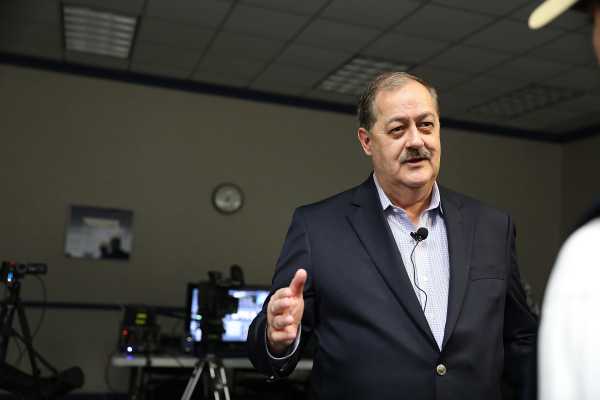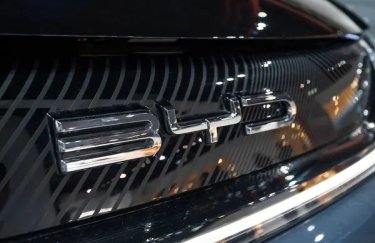
Coal baron Don Blankenship, tarred by a mining accident that killed 29 people, is one of the three leading Republican contenders in the West Virginia Senate race — which is quickly becoming one of the most-watched campaigns of 2018. Washington Republicans are doing their best to stop him and Blankenship is fighting back in a campaign increasingly filled with nasty and personal insults.
Meanwhile, Democratic groups actually appear to be propping up Blankenship by targeting his competitors with a TV ad barrage leading up to the May 8 primary.
Come November, West Virginia will be a top Republican target. It’s become something of a miracle the state still has a statewide Democrat at all, though Democratic Sen. Joe Manchin has a long history within the state. But he’s in choppy waters. While it has a working-class Democratic history, West Virginia went for Donald Trump by 42 points and hasn’t gone for a Democrat in the presidential election since 1996.
“There’s a very strong anti-establishment sentiment in West Virginia, and there’s also an ‘it can’t get any worse’ sentiment,” Patrick Hickey, a political science professor at West Virginia University, told me. “We’re just trying to shake it up.”
Blankenship is the GOP primary’s wild card. The former Massey Energy CEO has an extensive personal fortune and deep West Virginia ties in the state’s marquee industry. Then again, he also has a criminal conviction, and many voters in the state will never forgive him for the Upper Big Branch mining accident.
The coal boss shook up what had been a two-man Republican primary: Rep. Evan Jenkins and state Attorney General Patrick Morrisey have also thrown their hat in the ring.
“One candidate has no convictions, one candidate has a conviction, and the other guy is a carpetbagger,” Jeff Kessler, a Democratic politician in the state, told me.
The Hill reported that an outside group with links to Washington Republicans is spending $200,000 on TV ads to try to stop Blankenship. But the coal baron is firing back with a bizarrely personal campaign against Senate Republican leader Mitch McConnell, dragging his wife, Transportation Secretary Elaine Chao, into the race with odd allegations of Chinese influence — complete with the use of the word “Chinaperson” — while dubbing the Senate majority leader “Cocaine Mitch” in a strange new ad.
At the same time, national Democrats are pouring in their own money to try to bring down Morrisey and Jenkins. The New York Times’s Jonathan Martin saw the signs first:
Then Politico reported that the Democratic-allied group Duty and Country was spending nearly $400,000 to savage Jenkins and Morrisey — but sparing Blankenship. It sure looked like they were elevating the GOP candidate with the biggest vulnerability against Manchin, though they said it was because they believed the other candidates were more likely to be the nominee.
Democrats and Republicans at war … in a chaotic three person GOP primary campaign. Buckle up.
Don Blankenship and his criminal conviction, explained
Blankenship is, in many ways, an only-in-West-Virginia story. He grew up in Mingo County and got his college degree from Marshall University. He rose through the ranks at the Massey coal company, helping build it into one of the largest mining outfits in the country. By 2010, he was making nearly $20 million a year.
But then on April 5, 2010, 29 miners died in an explosion at Massey’s Upper Big Branch mine in southern West Virginia.
Blankenship stepped down soon after, but four years later, federal prosecutors indicted him on conspiring to willfully violate federal mining regulations before the accident and making false statements to the Securities and Exchange Commission in its aftermath.
The investigation laid bare Blankenship’s cutthroat vision of capitalism. This was a businessman who broke unions, laughed off climate change, despised federal regulations, and described his industry in Darwinian imagery. As I wrote for Talking Points Memo in 2014:
Blankenship was eventually convicted of conspiring to violate federal mine safety standards. He always maintained his innocence, even calling himself a political prisoner. But he still served one year behind bars, becoming a free man in May 2017.
And he has a not-insignificant chance of securing the Republican nomination for Senate in West Virginia in two weeks.
The West Virginia Republican Senate primary is a total mess
To rehabilitate his image, the Blankenship campaign has been running ads to convince West Virginians that his trial was a politically motivated attack by President Barack Obama.
Blankenship’s entry into the race upended what otherwise might have been a pretty generic contest between Jenkins and Morrisey: the mainstream GOP favorite and the candidate positioning himself as an outsider, respectively.
“He has deeper ties to the state than Jenkins or Morrisey do,” Hickey said of Blankenship. “He can say: ‘I was a Republican in West Virginia before it was cool to be a Republican in West Virginia.’ It’s that authenticity. He has guts. He’s real.”
Blankenship has sought to slime Jenkins, who has represented the southern half of the state in the House since 2015, as an ex-Democrat; Jenkins did indeed switch parties in 2013, though his supporters would remind you that is not an unfamiliar journey in a state like West Virginia.
The coal baron is hitting Morrisey, state attorney general since 2013, for a history of lobbying for drugmakers in a state with the worst opioid crisis in the country, though Morrisey has sued to make data on opioid sales more available while serving as attorney general.
Republicans in Washington, DC, have been worried about Blankenship for a while. The New York Times reported in February that McConnell did not want the former coal boss to be the party’s nominee in the race against Manchin. A new PAC, Mountain Families, with ties to establishment Republicans has attacked Blankenship on the state’s airwaves.
“Who will clean up Washington? Not convicted criminal Don Blankenship,” narration for one of the group’s ads begins.
Blankenship is directing plenty of fire back at McConnell, saying he does not back the long-time Republican leader and dubbing him the “swamp captain.” Then in a radio interview, he called the father of McConnell’s wife, Elaine Chao, “a wealthy Chinaperson” and insinuated that the Republican leader was therefore “soft on China.”
In his latest escalation, Blankenship ended an otherwise-normal ad by saying he wanted to “ditch Cocaine Mitch,” which Politico noted was an apparent reference to “a 2014 report in the liberal Nation magazine that drugs were once found aboard a shipping vessel” owned by the Chao family.
In an apparent countermove to DC Republicans, national Democrats are backing a group running ads hitting Jenkins for his past entanglements with overcharging health insurers and mocking Morrisey as a carpetbagger.
There isn’t a lot of good polling on the race right now. A February poll commissioned by Jenkins’s campaign showed him on top with 33 percent of the vote; Morrisey was at 25 percent, and Blankenship notched 18 percent of the GOP primary electorate’s support. Then the Hill reported earlier this month that Blankenship was placing either first or second in internal polls of the race.
Most recently, Politico reported that a poll commissioned by state GOP lawmakers found Morrisey leading at 24 percent, Jenkins close behind at 20 percent and Blankenship lurking with 12 percent.
Within the state, however, Democrats downplay differences between the Republican candidates. With the GOP’s attacks on health care, a successful teachers strike, and coal likely to dominate the debate during the general election, they don’t see much daylight.
“They’re all in the same bucket,” a West Virginia Democrat who supports Manchin told me. “They all want to destroy health care for West Virginians, they’re all against teachers when they’re striking, they’re all against coal miner safety.”
Can Joe Manchin hold on to West Virginia for Senate Democrats?
To win back the Senate in November, Democrats need to hold on to 10 Senate seats in states that Trump won. Going by the numbers, none is more challenging than West Virginia.
But Manchin has been elected statewide four times, as secretary of state, governor, and then US senator. His allies will point out that Manchin won reelection with 60 percent of the vote in 2012, the same year that Barack Obama got just 35 percent.
For now, Manchin is treading water with West Virginia voters: Morning Consult pegged him in April with 43 percent approval and 44 percent disapproval. Then again, the Wall Street Journal reported in March that a Republican poll found among GOP primary voters, Manchin was sitting pretty with 60 percent approval.
“Manchin is no stranger to running well above the party label here,” the West Virginia Democrat told me. “It’s not a new thing for him to be his own brand, and the brand is still strong.”
Then again, some Democrats in the state think that could be his undoing. Manchin endorsed then-Democrat Jim Justice in the 2016 governor’s race — and then Justice switched parties after sworn in and became a Republican. In the eyes of some skeptical Democrats, it epitomizes the senator’s problems.
Kessler, who ran for governor in 2016 against Justice, said to watch whether Manchin’s primary opponent, Medicare-for-all-endorsing insurgent Paula Jean Swearengin, registers at all on the Democratic side. Not that she should be expected to win, but if Swearengin has a strong showing, Manchin’s brand of centrism could be in trouble, Kessler argued.
“Joe is gonna have the race of his life, truthfully. Liberal and progressive wings of the party are not enchanted with him,” he said.
Manchin supporters roll their eyes, noting that labor unions like the state AFL-CIO are backing the senator and waving away the idea that Justice’s turncoat act could play a role in the Senate race.
“He pulled a fast one on everybody. That’s more the perception on the ground. It’s not a Manchin thing; it’s more of a Justice issue,” the Manchin-backing Democrat said, though Hickey told me that some Bernie Sanders supporters in West Virginia have not forgotten that Manchin supported Justice.
One wild card that could work in Manchin’s favor, as even Kessler acknowledges, is the teachers strike that took place in West Virginia this year. The state teachers walked out to demand a pay raise and better health care benefits from the GOP-led state government. Manchin appeared with them on the steps of the state capitol.
It was an unprecedented moment of political activism in the state. It seems at least possible that that energy will translate to anti-Republican votes in the fall.
“That will be an interesting thing to see,” Kessler said. “The teachers are extremely annoyed with the Republicans.”
But Manchin will still be fighting against that anti-government sentiment that seems so pervasive in West Virginia these days — and against Trump, who has put a target on the senator and remains overwhelmingly popular in the state.
“I think Manchin’s in a really tough spot too,” Hickey said. “He’s a career politician. He’s been around here forever.”
Whatever else, this race will not be boring.
Sourse: vox.com






